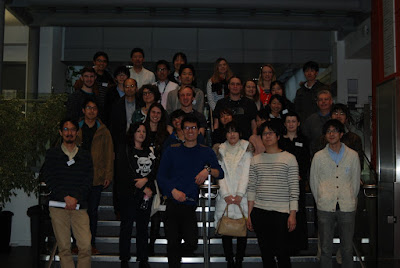As plant science PhD students, we feel it is vital to share our research with other scientists to generate new ideas for collaborative projects. For this reason we decided to organise the ‘Innovations in Plant Science to Feed a Changing World’ workshop, which was held in the University of Bristol Biological Sciences department in February 2017. The delegates included early-career scientists from Kyoto University, Heidelberg University and of course the University of Bristol.
 |
| Figure 1. The Conference Poster |
The University of Bristol has a long-standing partnership with Kyoto University and more recently, Heidelberg University, as our plant science groups share overlapping research areas. The main aim of the workshop was to encourage novel collaboration opportunities between the plant science groups, which would give rise to future projects, publications and ultimately funding.
Last year, Kyoto University hosted a highly engaging and productive workshop (see Sarah Jose’s blog post last year) for early-career scientists from the three universities in this coalition. Following from the success of this workshop, we decided to organise the second workshop, where participants could build upon the partnerships forged at the last meeting, form new links and present their results in a friendly environment. So, for the past six months, a team of PhD students and post-docs has been busy organising the meeting that took place in February.
As it turns out, organizing a three-day conference, even a relatively small one, is quite a lot of work. Getting venues, transfers, catering, accommodation and social activities booked all presented their own particular challenges. However, perhaps the most challenging task was designing the program for the workshop, which was set out into different themes to encompass the participants’ different subject areas.
All the organisation paid off when the visitors arrived, slightly (very) jet lagged from their long flights. Once the workshop had started, we were delighted with how smoothly the sessions ran and how engaging the talks were. Following the talks there were many discussions over coffee, during the poster session and break-out session. We also included a careers talk from Prof Tokitaka Oyama from Kyoto University, who shared his insights on how to succeed as a plant scientist. Another highlight was the keynote talk from Professor Keith Lindsey (University of Durham), who shared his fascinating work on modeling plant developmental biology.
In amongst all the science, we had time for an excursion to the University of Bristol Botanical Gardens where Nick Wray gave a fascinating tour, which was very enjoyable. We also visited the Wills memorial building tower and even had a go at ringing the bell!
| Figure 2. Nick Wray (far right) led a fascinating tour of the University’s Botanic Garden for the visitors. |
Although organising the workshop was a lot of work, it was definitely worth it. Our organisation, leadership and project management skills were trained and tested in the run-up to the workshop, but in the end, it went very well indeed. All the delegates thoroughly enjoyed their participation and a comment that was heard a few times was that delegates were impressed, not just with the quality of the science being presented, but also the quality of the scientific discussion particularly given that English was not the first language for the majority of the participants.
We hope that the links formed at the workshop will continue to develop into novel collaborative projects. – I (Donald) definitely benefited as the post-doc Massaki Okada even stayed on a few days to teach me some techniques.
We would like to thank our funders, the Bristol Centre for Agricultural Innovation and the New Phytologist Trust for their support. We’d also like to thank the other members of the organising committee whose hard work made this workshop so successful: Fiona Belbin, Deirdre McLachlan, Tsuyoshi Aoyama and Antony Dodd.
 |
| Figure 3. Group Photo |
Blog post by Donald Fraser & Katie Tomlinson

